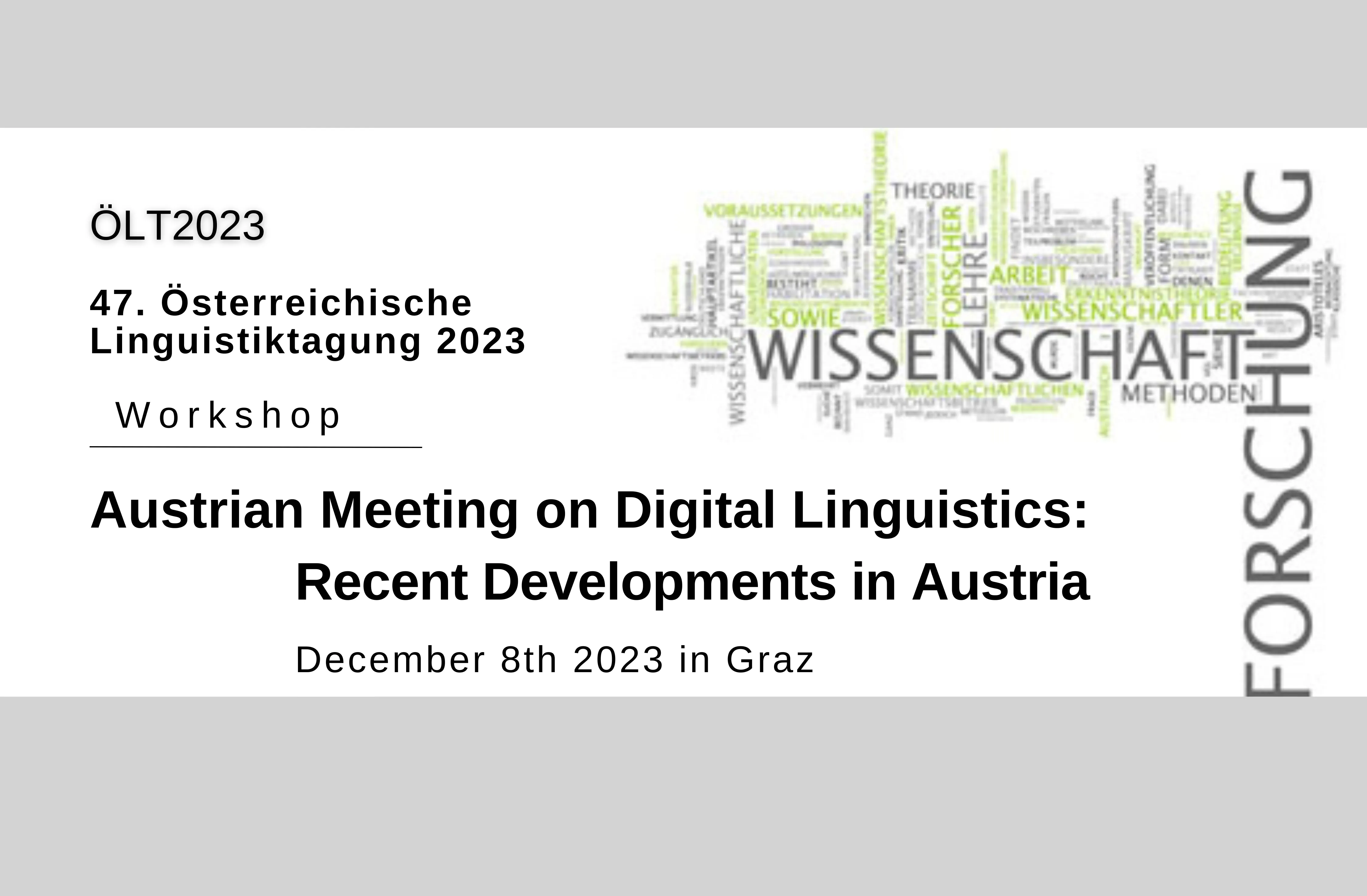
Austrian Meeting on Digital Linguistics: Recent Developments in Austria (at ÖLT 2023)
when: December 8th, 2023 – co-located with 47. Österreichische Linguistiktagung 2023 (8. – 10.12.2023)
where: Universitätszentrum Wall, 8010 Graz, Austria
registration: We welcome registrations until 30.10 via the Event-Tool ESRA.
More details can be found here.
Digital linguistics is a growing interdisciplinary field at the intersection of traditional linguistics, information technology, and social sciences. This can be seen by the growing number of new projects, publication series, and university courses. A central focus of digital linguistics is language data, i.e., digital artifacts that use human language as a form of expression. The range of this language data includes social media content, parliamentary transcripts, newspapers and medieval manuscripts, among others. Such data is processed, annotated, analyzed, curated, shared, archived, and reused, among other activities. Therefore, the topics covered in this field span from the creation of digital language resources (corpora, dictionaries, etc.) and their analysis, to the use of standards and research infrastructures, as well as methods for long-term archiving or reuse of language data.
Mörth and Wissik (2018) have already shown that Austria has a very active research landscape that engages with digital language resources in various ways and is embedded in the context of the European research infrastructure for digital language resources CLARIN (Fišer & Witt, 2022) and its Austrian counterpart CLARIAH-AT. Recent developments, such as new projects, university courses on digital linguistics, confirm that it is also a rapidly growing field in Austria.
The aim of this workshop is to highlight recent developments in the research landscape in Austria and to connect different projects from the Austrian research community that work with or on methods in digital linguistics, as well as the researchers involved. The workshop aims to facilitate the exchange of methodological insights and the creation of synergies through the mutual sharing of digital language resources, also within the framework of CLARIAH-AT.
References: Mörth, Karlheinz & Wissik, Tanja. “4. Digitale Sprachressourcen in Österreich”. Digitale Infrastrukturen für die germanistische Forschung, edited by Henning Lobin, Roman Schneider and Andreas Witt, Berlin, Boston: De Gruyter, 2018, pp. 73-88.
Fišer, Darja & Witt, Andreas. CLARIN: The Infrastructure for Language Resources, Berlin, Boston: De Gruyter, 2022.
Organizers: Tanja Wissik, Austrian Academy of Sciences, tanja.wissik@oeaw.ac.at
Karlheinz Mörth, Austrian Academy of Sciences, Karlheinz.Moerth@oeaw.ac.at
(preliminary) Programme
Friday, December 8th
Session 1
- 10:30 Digitale Linguistik und Forschungsinfrastrukturen: eine österreichische Perspektive
Tanja Wissik & Karlheinz Mörth (ÖAW)
- 11:00 10 Years of GRASS development: Experiences from annotating a large corpus of conversational Austrian German
Barbara Schuppler , Anneliese Kelterer & Martin Hagmüller (TU Graz)
- 11:30 Aufbereitung eines digitalen, variationslinguistischen Korpus zur (wissenschaftlichen) Weiternutzung – das SFB Deutsch in Österreich Korpus
Markus Pluschkovits & Markus Kunzmann (ÖAW)
- 12:00 Erstellung und Publikation von Sprachressourcen gemeinsam mit Bürger*innen – am Beispiel eines Wörterbuchs für “Deutsch in Österreich”
Barbara Heinisch (Uni Wien)
12:30 – 13:30 Lunch Break
Session 2
- 13:30 Safe (data) mining practices? Digital Discourse Studies and the role of social media providers
Susanne Kopf (WU)
- 14:00 Substantivplurale in vier österreichischen Korpora: Identifikation und Analyse von Standard- vs. Nonstandardformen aus Perspektive der digitalen Linguistik
Katharina Korecky-Kröll (Uni Wien / ÖAW)
- 14:30 Digitale Verfahren der Sprachanalyse und bildungsbezogene Linguistik
Cordula Meißner (Uni Innsbruck)
- 15:00 Deutsche Lautgesetzmaschine – Eine Projektskizze
Julian Blaßnigg (PLUS)
15:30 – 16:00 Coffee Break
Session 3
- 16:00 Digitale Linguistik und Digital Humanities am Institut für Sprachwissenschaft der Universität Innsbruck
Claudia Posch & Gerhard Rampl (Uni Innsbruck)
- 16:30 Eine korpuslinguistische Suche nach dem ‘Keyword’ in den Zaubermärchen der Brüder Grimm
Manfred Sellner (PLUS)
- 17:00 Frequency and other correlates of semantic change
Andreas Baumann (Uni Wien)
- 17:30 Diskussion & Résumé